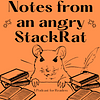Take a photo of a barcode or cover
challenging
dark
emotional
hopeful
informative
reflective
sad
fast-paced
Graphic: Body shaming, Fatphobia
emotional
informative
sad
medium-paced
Graphic: Fatphobia
challenging
informative
reflective
An informative, scathing stab at diet culture and a world that insists we shrink ourselves, this was a great audio listen. I loved the incorporation of both scientific data and author autobiographical information, making a book that is likely to appeal to a wider audience depending on what you are drawn to for an impact.
Perfect for anyone trying to dismantle internal and external fatphobia, lovers of timely non-fiction, and anyone who has wished they were "smaller"
Perfect for anyone trying to dismantle internal and external fatphobia, lovers of timely non-fiction, and anyone who has wished they were "smaller"
Graphic: Fatphobia
challenging
emotional
funny
hopeful
informative
inspiring
reflective
medium-paced
This is a hard book to read or listen to if you are struggling with body issues, especially related to being overweight, but it is worth pushing through and keeping going. Kate Manne uses her own anecdotes and life experiences in a way that speaks to shared fat experiences while mixing with science and research. I won’t say I enjoyed it because that is the wrong word, but the book did make me think, laugh and cry.
Graphic: Body shaming, Fatphobia, Medical content
Moderate: Medical trauma
This book expressly deals with weight issues and fatphobia
hopeful
informative
reflective
medium-paced
I appreciate that the author emphasizes the systemic nature of anti-fatness and its connections to other systems of harm.
Fatphobia is a form of structural oppression that--just like any other--is based on a socially constructed hierarchy of bodies and intersects with other systems of oppression (e.g., a fat Black woman is treated considerably worse than a fat white man).
Specifically, anti-fatness is rooted in and upholds racism, in particular anti-blackness.
Fatphobia also often serves as an outlet for other forms of bigotry because it's more socially acceptable to be anti-fat than it is to be racist or classist.
The author advocates for fat liberation and body reflexivity, although I wish the author had spent more time on that. Seems weird to introduce a new concept in the conclusion.
Key takeaways:
-Fuck diet culture, but also beauty culture in general.
-You have a right to shrink yourself or have plastic surgery (accepting all health risks/ consequences), but you are not obligated to.
-You can resist fatphobia by refusing to diet. In doing so, you're also standing up to the other systems of harm that are tied to, or intersect with, fatphobia.
Your body is for you.
It's not for consuming, comparing, assessing, or ranking.
It's not good, bad, or neutral.
You're not required to have any particular attitude toward your body, and your perspective is the only one that matters.
You are not responsible for pleasing others.
You can appreciate bodies, viewed through an uncritical lens, in all their diversity.
Fatphobia is a form of structural oppression that--just like any other--is based on a socially constructed hierarchy of bodies and intersects with other systems of oppression (e.g., a fat Black woman is treated considerably worse than a fat white man).
Specifically, anti-fatness is rooted in and upholds racism, in particular anti-blackness.
Fatphobia also often serves as an outlet for other forms of bigotry because it's more socially acceptable to be anti-fat than it is to be racist or classist.
The author advocates for fat liberation and body reflexivity, although I wish the author had spent more time on that. Seems weird to introduce a new concept in the conclusion.
Key takeaways:
-Fuck diet culture, but also beauty culture in general.
-You have a right to shrink yourself or have plastic surgery (accepting all health risks/ consequences), but you are not obligated to.
-You can resist fatphobia by refusing to diet. In doing so, you're also standing up to the other systems of harm that are tied to, or intersect with, fatphobia.
Your body is for you.
It's not for consuming, comparing, assessing, or ranking.
It's not good, bad, or neutral.
You're not required to have any particular attitude toward your body, and your perspective is the only one that matters.
You are not responsible for pleasing others.
You can appreciate bodies, viewed through an uncritical lens, in all their diversity.
Graphic: Body shaming, Fatphobia
Moderate: Child abuse, Eating disorder, Emotional abuse, Misogyny, Racism, Sexual assault, Gaslighting, Sexual harassment
Minor: Ableism, Homophobia, Transphobia, Antisemitism
informative
slow-paced
As a fat person myself, most of this information was well known. I hope many of the slim or skinny people are reading this like they should to educate themselves. You gotta start somewhere.
Still a decent read, somewhat triggering for me, but yeah, that's to be expected.
Still a decent read, somewhat triggering for me, but yeah, that's to be expected.
Graphic: Fatphobia
Minor: Child abuse, Sexual violence
challenging
informative
reflective
It’s been hard for me to gather my thoughts on this book and since reading it at the same time as Aubrey Gordon’s “You Just Need to Lose Weight” it’s also hard to not compare the two. But I will do so anyways.
This book has the subtitle “how to face fatphobia” yet doesn’t really have as many calls-to-action as Gordon’s book, and seems to be more of a focus on the history of fatphobia and how it affects todays world. It’s incredibly well researched and detailed though can sometimes get dry in areas and found it hard to keep focus.
I appreciated the moments in which Manne delved into more personal stories or her life and experience as a fat person. While I do wish there was more of that in this book I knew going in (and during reading) that this was not a memoir and aimed to serve a more
philosophical purpose.
That being said, many moments in this book did make me emotional and angry and guilty and everything in between. I made me look back and process how horribly different I was treated when I was thin vs fat (now). Having it be pointed out so matter-of-factly that people DO treat fat people worse than thin people was like no other feeling I’ve ever felt before. The validation was insanely bittersweet.
My absolute favorite quote has got to be:
“fatness can elicit fear and repel just the right people, whose intolerance for wayward flesh makes them the wrong ones to get close to.”
And at the expense of getting too personal,
It reminded me of every asshole I’ve ever let touch me out of a fervent need to be desired and I think how none of them would ever look twice at me as I am now. And when I stupidly sulk over how no one holds doors for me anymore and how I never receive as many “please”s or “thank you”s or random compliments from strangers or even just passing smiles as I used to, I remember that it is not my job to fit anyone’s aesthetic preferences. And it is not my fault that some people choose to be kinder to others. My body is just that: my body. And I am happier and healthier now than I ever was while thin.
EDIT: LOL also as I contemplate deleting the above statement for fear that I am not currently “fat enough” or was never “thin enough” to have these feelings be legitimate I remember that women are constantly shamed to no end for their size and we all have a right to talk about our own individual experiences. It’s shitty body shaming men that are the problem, not me. @ future me rereading this anxiously: your experiences as a fat chick matter. don’t delete this istg
Ands that’s exactly what makes me like this book so much. It made me look back as well as forward. It was helpful in assisting my ongoing plight of releasing the idea of losing weight again forever.
Despite being flat at times, I very much appreciate the thought processes it made me go through.
So yeah pretty good book 👍🏼
This book has the subtitle “how to face fatphobia” yet doesn’t really have as many calls-to-action as Gordon’s book, and seems to be more of a focus on the history of fatphobia and how it affects todays world. It’s incredibly well researched and detailed though can sometimes get dry in areas and found it hard to keep focus.
I appreciated the moments in which Manne delved into more personal stories or her life and experience as a fat person. While I do wish there was more of that in this book I knew going in (and during reading) that this was not a memoir and aimed to serve a more
philosophical purpose.
That being said, many moments in this book did make me emotional and angry and guilty and everything in between. I made me look back and process how horribly different I was treated when I was thin vs fat (now). Having it be pointed out so matter-of-factly that people DO treat fat people worse than thin people was like no other feeling I’ve ever felt before. The validation was insanely bittersweet.
My absolute favorite quote has got to be:
“fatness can elicit fear and repel just the right people, whose intolerance for wayward flesh makes them the wrong ones to get close to.”
And at the expense of getting too personal,
It reminded me of every asshole I’ve ever let touch me out of a fervent need to be desired and I think how none of them would ever look twice at me as I am now. And when I stupidly sulk over how no one holds doors for me anymore and how I never receive as many “please”s or “thank you”s or random compliments from strangers or even just passing smiles as I used to, I remember that it is not my job to fit anyone’s aesthetic preferences. And it is not my fault that some people choose to be kinder to others. My body is just that: my body. And I am happier and healthier now than I ever was while thin.
EDIT: LOL also as I contemplate deleting the above statement for fear that I am not currently “fat enough” or was never “thin enough” to have these feelings be legitimate I remember that women are constantly shamed to no end for their size and we all have a right to talk about our own individual experiences. It’s shitty body shaming men that are the problem, not me. @ future me rereading this anxiously: your experiences as a fat chick matter. don’t delete this istg
Ands that’s exactly what makes me like this book so much. It made me look back as well as forward. It was helpful in assisting my ongoing plight of releasing the idea of losing weight again forever.
Despite being flat at times, I very much appreciate the thought processes it made me go through.
So yeah pretty good book 👍🏼
Moderate: Body shaming, Fatphobia, Racism
challenging
hopeful
inspiring
reflective
sad
fast-paced
An unflinching look at how fatphobia is a systemic killer, how fat bodies are routinely ignored, degraded, and brushed aside. From it's roots in racism to it's connections to all of types of discrimination. This book was a powerful yet hard read.
Graphic: Fatphobia, Racism, Sexism, Transphobia
challenging
informative
medium-paced
I’ve liked Kate Manne’s previous work, so I was excited to read her philosophical perspective on fatphobia and it didn’t disappoint. The book is well written, well researched, and more accessible than most philosophy texts and even the author’s previous books. While some of the topics are familiar if you’ve read writers like Sabrina Strings or Aubrey Gordon, others feel unique to Manne, such as fatphobia in academia and the politics of morality that we assign to fatness.
Graphic: Eating disorder, Fatphobia
medium-paced
This book does a great job of being an introduction to fatphobia while not neglecting (and even emphasizing!) the intersectionality of fatphobia's origins and impacts. I could've done with some recommendations or framing on things nonfat people can/should do and advocate for to face fatphobia. On the whole though, it's a great introduction and I'll probably buy a copy to reference when I need citations to support my everyday existence.
Graphic: Fatphobia






